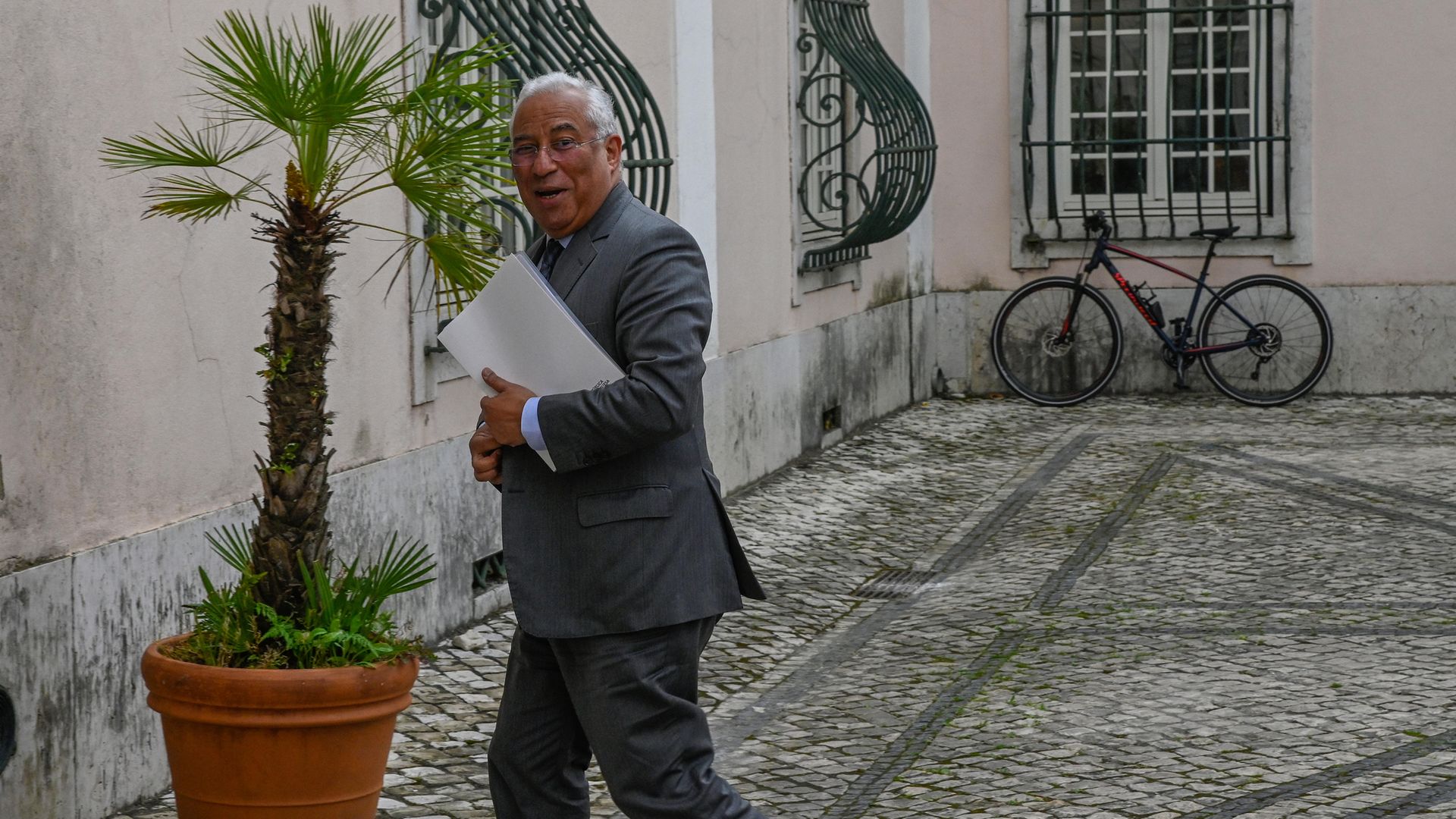
ALASTAIR CAMPBELL on what parties of the left and centre can learn from Portugal.
As I near the end of my second lockdown German course I am getting closer to the fluency I had around forty years ago before I started losing it (German, that is.) Is it too much if I do my German homework as my column this week? Honestly, I think you’ll find it quite interesting! I hope so.
The task was to write, in German, a summary of a contemporary German book, and also to translate into my Muttersprache a passage I found especially interesting. The book I chose is Realitätsshock (hopefully no translation required), which looks at ten modern challenges, from climate change to migration, China to artificial intelligence, and seeks to find hope amid the considerable despair of our times. Its author is Der Spiegel columnist Sascha Lobo, a very smart guy with an amazing bright red Mohican haircut.
The passage I chose to translate, from his chapter on the lurch to the right in politics, Rechtsruck, is about an EU country that does not get enough attention, even in The New European. Looking at the rise of authoritarianism around the world, and the near total absence of social democrat governments in the EU, Lobo asks if we simply need to resign ourselves to the rise of the right in Europe. “But perhaps not … if we look wider,” he suggests. “Because there is one European country that has many of the requirements for a lurch to the right but which – until now at least – has turned out to be immune against it: Portugal. The same was said about Spain, until the immunity suddenly dwindled with the election of the extreme right VOX party into the Spanish parliament in April 2019. So I accept the risk that the following insights could be out of date at some point. In the absence of all else, we can clutch at Portuguese straws.”
Lobo recounts how the 2008 financial crisis hit Portugal hard and how its social democratic PM had asked the EU for help. But the savings programme demanded by the EU was rejected by parliament. New elections in 2011 lead to a right-wing conservative government, which went about meeting the demands of the EU.
“Workers’ rights are dismantled, social benefits cut, the budget deficit attacked with all might. The country follows the austerity diktats of the EU, largely shaped by Angela Merkel and Wolfgang Schäuble,” Lobo writes. As a consequence, the Portuguese economy shrank, poverty increased and unemployment hit almost 18% by 2013. Youth unemployment was as high as 40%, and the young start to move abroad.
He adds: “This already economically fragile country threatens to collapse into nothing. This is a still young democracy, as it was not until the mid-1970s that the military dictatorship was abolished.”
But Lobo then goes on to describe how, at elections in 2015, the conservatives were punished and the “charismatic but down-to-earth social democrat Antonio Costa wins. [My bracket: In fact, his party came second in the vote but…] The former mayor of Lisbon unites the previously divided parties of the left to form a stable minority government”.
Against strong warnings from the EU, Costa cancelled the austerity course, increased pensions and wages, reintroduced holiday entitlements cut by his predecessor. He set up an extensive investment and infrastructure programme for the whole country and cancelled tax rises imposed by the conservatives on the general population. On the other hand, he increased taxes that affected the wealthy – on inheritance, wealth and property. He also stopped the privatisations with which the previous government followed the EU guidelines. Schäuble was concerned: “Portugal is making a serious mistake if they no longer adhere to what they have committed to.”
But at the end of Costa’s first term, Portugal was in a splendid position. As Lobo describes, he had seriously committed to social investment and had not made the mistake of being simultaneously hostile to business. That led to a boom and Portugal becoming what Lobo describes as “the model student of the EU”. The year 2017 saw the highest economic growth in the 21st century, and the all-important tourism sector set one record after another through targeted subsidies, tax breaks and investments. Unemployment fell to 6.7%, youth unemployment halved, and the budget deficit was down to only 2% – “precisely because they chose decisively to invest not save,” writes Lobo.
“With almost 30% connected to fibre optics, by 2018 the digital infrastructure was more than ten times (!) better developed than in Germany. Lisbon replaced Berlin as the European start-up capital. The largest internet conference in Europe moved from Dublin to Lisbon in 2017 and concluded a ten-year contract with the city in 2018. The young digital economy benefits from an extensive investment and support programme.”
But here is Lobo’s key point, his reason for singling out the Portuguese: “At the beginning of 2019, Portugal is alone among the larger countries of the EU in having no serious right-wing extremist party. The right-wing argument to explain this is that only 0.1% of people living in Portugal are Muslims, but it doesn’t stand up; Poland has 0.08% Muslim population, Hungary 0.03, and both are countries with extreme right-wing governments.’
Lobo speaks of “ein politisches Mittel“, (it translates as ‘political means’, but I can’t help but see a resonance with ‘Mitte’ meaning middle ground,) which he says can fight back against the right through “a good polarisation: the creation of a simple and comprehensible future narrative that is not based on social division. A policy in which progress in society is not just a word on a placard, but can be experienced in everyday life. Where liberal democracy not only calls itself that, but also feels like it is pointing the way to a future that will be determined by co-operation. The change caused by digitisation and globalisation is stressful enough; add the simultaneous experience of a crumbling infrastructure and it’s too much. The feeling that a country functions on a day-to-day basis – from the rule of law, to the social and health systems to public transport – is a value that is not to be underestimated, and it can provide a lot of support in turbulent times”.
So, as I wait for my ‘sehr gut erfüllt’ marking from my tutor in Leipzig, a few immediate reflections.
First, I hope Brextremist readers note I am capable of publishing words critical of the Merkel government, given how often some of them regularly tweet she or president Macron “must be paying” me to keep banging the anti-Brexit drum. Second, I hope they also note that Costa proves it is entirely possible to pursue, dare I say, sovereign economic and social policies, in disagreement with other leaders, without pretending the only other option is to leave the EU, so self-harming political and economic power, as is clearly happening to the UK, despite a widespread media omerta in favour of round the clock vaccine flag-waving. Third, Costa was re-elected in 2019 with a bigger share of the vote and more seats in parliament.
Fourth, to the Corbynistas who regularly troll me with the accusation that “people like you” are responsible for Brexit and Johnson, because we did not fight whole-heartedly for Jeremy Corbyn, I would point to Lobo’s observation that Costa married commitment to social justice with business-friendly rhetoric and policy, a little like the last Labour leader to win a general election here, namely Tony Blair.
But finally, I would take some hope from the fact that back then, it was the right in Europe who, as Blair and Gerhard Schroeder and other social democrats vastly outnumbered conservatives at EU Summits, worried about extinction. Change comes, and often in waves. Change comes especially in countries where a government screws up because it takes its own vision and its own power for granted, as happened to the Portuguese right, and as is definitely happening to our bunch of incompetents, liars and charlatans, whose decade of austerity left the country’s infrastructure and health systems unprepared for a pandemic, and who have undermined the rule of law and our institutions without regard for anything but their own short-term interest. Certainly, Britain does not feel like it is functioning well on a day-to-day basis.
But then you need the alternative, that the public is ready to see as such. When we can all travel again, I recommend Keir Starmer and his team head to Lisbon, and make inquiries; and to any UK publisher interested in a new ‘smart thinking’ title, you could do worse than get Lobo’s whole book translated, not just the section I’ve done for my homework.
What do you think? Have your say on this and more by emailing letters@theneweuropean.co.uk











